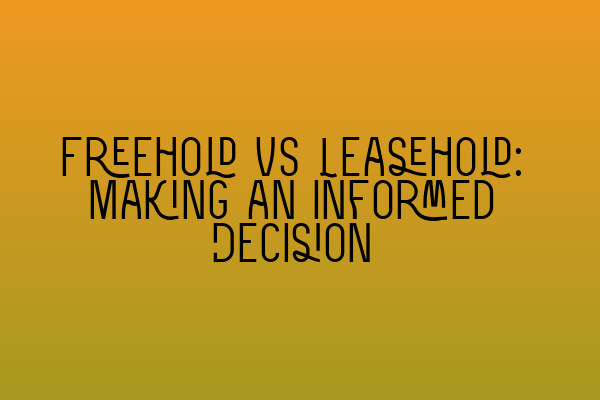**Freehold vs Leasehold: Making an Informed Decision**
When it comes to property ownership, one of the first decisions you’ll need to make is whether to opt for a freehold or a leasehold property. Understanding the differences between these two types of ownership is crucial to making an informed decision that aligns with your goals and aspirations. In this article, we’ll explore the key factors you should consider when choosing between freehold and leasehold properties.
**What is Freehold?**
Freehold ownership means that you own the property and the land it stands on outright. You have full control and responsibility for the property, including the land it occupies. Freehold properties typically have no time restrictions and no ground rent to pay.
**What is Leasehold?**
Leasehold ownership, on the other hand, means that you own the property for a fixed period of time but not the land it sits on. In leasehold properties, you have a lease agreement with the freeholder or landlord, which outlines the rights, responsibilities, and restrictions you have as the leaseholder. Leasehold properties often come with ground rent and service charges that you’ll need to pay to the freeholder.
**Key Factors to Consider**
1. **Long-term Security and Control**
Freehold properties provide the highest level of security and control as you have complete ownership. You can make decisions regarding renovations, modifications, and maintenance without seeking permission from anyone else. Leasehold properties, on the other hand, offer a limited term of ownership, which can create uncertainty and restrictions in the long run.
2. **Maintenance and Service Charges**
When considering a leasehold property, it’s essential to carefully review the terms of the lease agreement, particularly the service charges and ground rent. These ongoing costs can vary greatly, and they need to be factored into your budget. Additionally, it’s important to assess the management and maintenance of the property to ensure that the charges are reasonable and the property is well-maintained.
3. **Responsibility for Repairs**
As a freeholder, you have sole responsibility for the maintenance and repairs of the property. In contrast, leasehold properties often place the responsibility for repairs on the freeholder or the management company. This can be a double-edged sword, as you may have less direct control over the quality and timing of repairs, but you are also relieved of some of the financial burden and logistical concerns.
4. **Resale Value**
Historically, freehold properties have commanded higher resale values compared to leasehold properties. However, modern leasehold properties with longer lease terms can still be attractive to buyers. It’s important to consider the potential impact of lease length on the property’s resale value and the marketability of leasehold properties in the future.
5. **Ground Rent Increases**
When evaluating leasehold properties, it’s crucial to understand the terms around ground rent increases. Some leases include clauses that allow for substantial increases in ground rent over time. These escalating ground rent clauses can make the property less desirable to potential buyers in the future and may even lead to difficulties in securing a mortgage.
**Conclusion**
Choosing between freehold and leasehold properties is a significant decision, and it’s essential to weigh the pros and cons of each option carefully. Freehold ownership offers long-term security and control, while leasehold ownership provides more affordable entry points and shared responsibilities. By considering factors such as long-term security, maintenance costs, repair responsibilities, resale value, and ground rent increases, you can make an informed decision that aligns with your lifestyle and financial goals.
At SQE Property Law & Land Law, our team of expert solicitors can guide you through the complexities of property ownership and help you make informed decisions. If you’re preparing for SQE exams or looking for preparation courses, be sure to check out our related articles for helpful resources:
– [SQE 1 Practice Exam Questions](https://fqps.co.uk/sqe/sqe1-preparation/mcq-practice-quiz)
– [SQE 1 Practice Mocks FLK1 FLK2](https://fqps.co.uk/sqe/sqe1-preparation/practice-mocks-quiz)
– [SQE 2 Preparation Courses](https://fqps.co.uk/sqe/sqe2-preparation)
– [SQE 1 Preparation Courses](https://fqps.co.uk/sqe/sqe1-preparation)
– [SRA SQE Exam Dates](https://fqps.co.uk/sqe/sqe1-sqe2-exam-dates)
Contact us today to speak with one of our solicitors and receive expert guidance on your property ownership journey.
